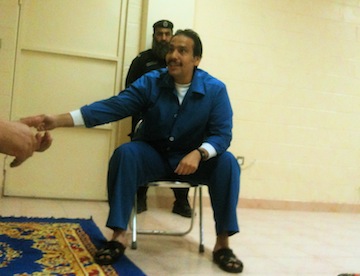
Amidst Qatar's glittering towers and thrumming souks, the thousands of climate negotiators and reporters gathered last week in the tiny Gulf nation are unlikely to see one of its most exceptional sights -- a jailed poet.
Mohammed al-Dheeb al-Ajami, known to followers and fans as Ibn al-Dheeb, was sentenced last week to life in prison for a poem which included criticism of the Qatari ruling family.
On the day of his sentencing, I met Mohammed at his prison on the dusty outskirts of the city, as part of a small group of international legal observers. The 37-year-old poet and literature student remained defiant, but the details we were able to gather on his case were, as Shakespeare might have said, "passing strange."

Ibn al-Dheeb, undaunted in his prison cell
A phone call one year ago from the Emir's son, saying the police wanted a brief word with him about a poem he had written in praise of Tunisia's Jasmine Revolution. Five months in solitary confinement, the charges unknown ("Even when they refused me pen and paper," Mohammed told me, "I wrote new poems in my mind.") A realization that the poem under scrutiny was actually a 2010 riposte, part of Qatar's equivalent of a hip-hop battle, from al-Dheeb to rival Khalil al-Shabrami, a favorite poet of the emir. The testimony of two "poetry experts" from Qatar's Ministry of Culture, applying their interpretation of rhyme and meter to reveal al-Dheeb's seditious political intent. Court proceedings held in secret, his private lawyer dismissed, a possible cut-and-paste job on the official court transcript, all culminating in a life sentence handed down in five minutes at a hearing the defendant was not invited to attend. (All these irregularities were waved away as idle rumors by Qatar's Attorney General, a gracious and witty Sorbonne Ph.D. who received us in his plush, high-rise office.)
The strangest thing about Ibn al-Dheeb's case? He may be guilty.
Article 134 of Qatar's penal code outlaws any criticism of the Emir or his son. Article 136 applies the penalty of "perpetual imprisonment" to "anyone who instigates by public means to overthrow the regime of the country, undertakes such propaganda or calls by public means to adopt a doctrine aiming to destroy the fundamental values of the State, to change the social or economic system prevailing in the country by use of force or through any illegal means."
As an American lawyer and poetry-lover, I read these laws with horrified indignation. As a classicist, though, they were uncannily familiar. For at the heart of the Western tradition, the foundation stone of law and philosophy, lies Plato's Republic, and on the subject of poets and free speech, Plato cast his lot with the Qataris. As an antidote to the raucous and fickle democracy which had put his mentor Socrates to death (after a satirical ripping by the poet Aristophanes), Plato created his ideal republic as a place where reason and virtue would triumph over the "imitations" of idle poets.
Why should a great state care about lowly verse-makers? Because, the Athenian argued, "rhythm and harmony penetrate the inner part of the soul more than anything else," and thus an impious poet "puts a bad constitution in the soul of each citizen." Iambs and trochees: the stuff of revolution.

Plato: founder of Western political theory, no friend to poets.
Asked about al-Dheeb's sentencing, a State Department spokesman said that the United States is "obviously concerned" and is "seeking additional information from the Qataris about this case." Should the Obama administration rally to the cause of poetic freedom? Should our diplomats put the screws on the emirate of Qatar, our ally in Libya, purveyor of our petroleum, friendly host of UN climate negotiations and the 2022 World Cup?
Before we answer with rattled sabers and a self-congratulatory cry, we might pause.
It is easy enough to judge the Qataris from a distance as atavistic tyrants, a repressive regime that underscores the superiority of our own way of life. But the tension between individual freedom and an ordered state is, as the Republic reveals, not a Middle-Eastern problem but a human one. Amidst all the strangeness of al-Dheeb's case, our two nations may be more similar than they are different. Too many unpleasant pages of American history -- the Alien & Sedition Acts, McCarthy vs. Hollywood, Nixon's wiretaps -- testify that our own battle for free speech is old and ongoing.
So yes, let's stand for Ibn al-Dheeb's right to raise his voice, by supporting the heroic work of Amnesty, Human Rights Watch, and others. But as we do, let's reflect on our own lapses of justice, and lend a keener ear to the voices our own society has drowned out. As Plato never failed to affirm, to bring change in the world around you, you must first change yourself.